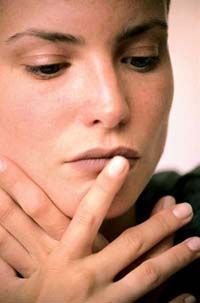You've heard the line before. A woman flies off the handle at work or at home and some joker says, "It must be that time of the month."
Advertisement
The remark, of course, ignores the fact that women sometimes have good reason to get upset or fed up with the demands made on them by husbands, children, and jobs. For some women, however, comments such as this, although made in jest, hold more truth than they'd like to admit. For these women, "that time of the month" really is a period of emotional imbalance and seemingly unprovoked or out-of-proportion anger, depression, and anxiety. Situations that they normally cope well with suddenly become insurmountable. And the energy and health they enjoy most of the time give way to fatigue, discomfort, and weight gain almost overnight.
These women have what is known as premenstrual syndrome, or PMS, a condition with an unknown cause and no complete cure. There are, however, some ways to reduce the impact of PMS, using minor lifestyle changes, preventative measures and home remedy treatments. In this article, we will show you 25 ways to ward off PMS' negative effects by eating the right foods and avoiding other substances. In addition, you'll learn some natural home remedies for dealing with what effects you do experience, some of which use very common items found in your kitchen. But first: Let's discuss what PMS is.
Doctors don't really know what causes PMS, but they believe it is a result of hormonal changes, particularly in estrogen, that occur around the menstrual cycle. Some believe that PMS mood swings may be related to deficiencies in vitamin B6 and magnesium. One theory of PMS suggests that its symptoms are due to an ovarian hormone imbalance of either estrogen or progesterone. Still, no one really knows why certain women develop PMS, and research has produced contradictory evidence.
Whatever the cause, the symptoms can include irritability, mood swings, and anger. Indeed, the emotional symptoms, which occur in more than 80 percent of PMS sufferers, are what often drive women to their doctor's office. Other symptoms may include sugar cravings, headaches, dizziness, shakiness, abdominal bloating, breast tenderness, and overall swelling (from edema, or fluid retention). Much less common are depression, memory loss, and feelings of isolation. The symptoms of PMS appear to occur in a cycle, and their severity varies from woman to woman. As a rule, PMS symptoms typically begin a few days to a week before menstruation and fade once the woman's menstrual period begins. Researchers believe that about 40 percent of women of child-bearing age experience PMS in some form. Symptoms and severity vary from mild and manageable to severe and disruptive. Some women have only one symptom, while others have a whole constellation of symptoms. But PMS can be downright brutal for about 15 percent of women. They're the ones who experience many symptoms to a debilitating degree, causing serious problems on the job and in interpersonal relationships.
Even though it's not fully understood, PMS is now recognized as a legitimate condition. There are medications available that can mitigate or stop many of the harshest symptoms. Like so many other conditions, though, there are simple home remedies that will work to relieve symptoms. So try them and see what happens. If you're a PMS sufferer, you know that anything that might help is worth a try.
To learn more about the female reproductive system and potential issues associated with it, visit the following links:
- To see all of our home remedies and the conditions they treat, go to our main Home Remedies page.
- For general information on women's bodies, check out How Women Work.
- To read about sexual intercourse issues, visit How Sexual Dysfunction in Women Works.
- For background on treating UTIs with household items, read Home Remedies for Urinary Tract Infection.
This information is solely for informational purposes. IT IS NOT INTENDED TO PROVIDE MEDICAL ADVICE. Neither the Editors of Consumer Guide (R), Publications International, Ltd., the author nor publisher take responsibility for any possible consequences from any treatment, procedure, exercise, dietary modification, action or application of medication which results from reading or following the information contained in this information. The publication of this information does not constitute the practice of medicine, and this information does not replace the advice of your physician or other health care provider. Before undertaking any course of treatment, the reader must seek the advice of their physician or other health care provider.
Advertisement


